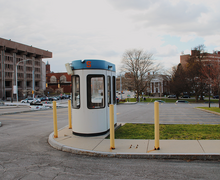Barillari: Revamped constitution promotes interior change to make SA more effective
Ben Jones doesn’t crack codes, he creates them.
As the first member of the Student Association to tackle revamping the governing body’s entire constitution since 1998, Jones is taking real action to solve the organization’s noticeable inefficiency. He is not fashioning lofty promises, but instead penning potential, visible reform.
At Monday’s SA meeting, Jones, the organization’s parliamentarian, presented the Committee on Administrative Operations’ draft of what it believes SA’s constitution should become. In a vibrant blue collared shirt and orange tie, Jones proved to be more than just a keeper of constitutional coding — he is now also its maker.
The draft promotes effective change in several current problem areas, including a better outline of how disciplinary actions within the organization will be handled. But, two particular aspects may truly make the organization more capable of its student-serving goals: the creation of a speaker of the assembly position and the forced re-vote ability of the president.
It’s time the general assembly gains a level of autonomy from the rest of the organization. Jones said his goal behind creating the speaker complies with this concept by allowing the assembly to take independent actions with its own leadership.
The speaker would now set the agenda for and be the leader of weekly assembly meetings instead of the president.
“If the assembly begins to have its own power and can organize policies that it wants, go in a direction it wants, then that makes assembly meetings more relevant,” Jones said.
Though this sense of relevance and self-determined leadership will hopefully allow the assembly to function with greater power, the most important outcome of the speaker position is the betterment of the presidency.
By removing “procedural concerns from the president’s plate,” the president can focus on broader initiatives for the entire organization, Jones said.
In the context of Jones’ suggested progressive presidency also comes a forced assembly re-vote feature. As the leader of the association elected by the entire student body, the president’s vision for SA should be more clearly enforceable.
Jones’ concept may deliver exactly that.
His recommendation will allow a piece of legislation that is passed by the assembly to be forcibly revisited if the president feels “the action was wrong or it’s not the direction the organization as a whole should go in,” Jones said. After reconsidering the legislation, the assembly would need to pass it by a 2/3 vote to be finalized.
This will encourage the president to more clearly outline what his or her goals are at the start of the term.
The proposed language does not allow the president to force reconsideration if the assembly does not pass a piece of legislation. In the next several weeks of assembly approval, it would be wise to include this feature if members want presidential visions to be more effectively enacted.
It is imperative that the assembly adopts Jones’ proposal before the SA elections begin on Nov. 11. For the new constitution to be ratified, the student body must vote in favor of it as a referendum on the ballot.
Jones said his proposals are not a reaction to past issues within the organization. Rather, it is a response to consistent concerns he has witnessed throughout his SA career. He plans to revamp the rest of the organization’s codes in the near future.
“I truly believe that by changing how we work on the inside we can make what we do on the outside that much better and that much more effective,” Jones said.
Though his ideas are credible, it is now up to the assembly to decide if Jones will continue his title as code maker, or if he will remain as the keeper of existing inefficiency.
Rachael Barillari is a senior political science and Middle Eastern studies major. Her column appears weekly. She can be reached at rebarill@syr.edu and followed on Twitter at @R_Barillari.
Published on September 26, 2013 at 2:30 am





